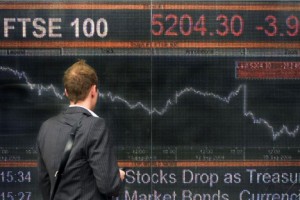10 Things You Need to Know About the UK Bear Market
 The stock markets around the world are currently going through a correction. Even though this is a potentially good place for bargain hunters, the market is not immune to further falls. There are numerous factors which may cause the current bear market to continue. If you are not familiar with these concepts, there are several things you should know about the UK bear market.
The stock markets around the world are currently going through a correction. Even though this is a potentially good place for bargain hunters, the market is not immune to further falls. There are numerous factors which may cause the current bear market to continue. If you are not familiar with these concepts, there are several things you should know about the UK bear market.
1) What constitutes a bear market?
The stock market is constantly experiencing fluctuations. However, if the stock market reaches a peak, and then experiences a downward trend over a sustained period of time, the market becomes a “bear market”. One of the key indicators for a bear market is that it experiences a drop of over 20 percent from a previous high. These are the conditions where numerous investors decide to sell their assets, increasing the downward trend for the whole stock market.
2) Why is the stock market currently in bear territory?
Each market fall is influenced by various different factors – the economy is very much interdependent on the world economy, as a great number of big companies trade worldwide. The current crisis has occurred as a result of the slowing down of the world’s second largest economy, China. The slowing of their economy has impacted on economies around the world.
Due to the fact that China is a massive consumer of raw materials and other goods, high growth of several economies around the world were closely tied with China’s growth. As the demand for various raw materials has significantly dropped, many FTSE mining companies, such as Glencore and Anglo American, have experienced a huge loss in value. All this has led to a drop in stocks of major UK companies, as this trend continued over a longer period of time, across the market.
3) Does the FTSE drop hurt ordinary people?
 This question often pops up as people become worried about their pension funds. Most pension fund managers will be diversified enough to minimise the impact of stock market falls, but funds will still be impacted one way or another.
This question often pops up as people become worried about their pension funds. Most pension fund managers will be diversified enough to minimise the impact of stock market falls, but funds will still be impacted one way or another.
While most managed pension funds will not be too badly affected, it is important to mention that there are around 5 million people who make their monthly payments to stock-based pensions. These are the people whose pensions have been dealt a serious blow by this stock market drop.
4) What about the lending interest rates?
Interest rates are less likely to increase during the following months. The Bank of England recently pushed back their rate rise ‘horizons’ and the recent turmoil – not to mention Brexit referendum – will mean a rate rise is unlikely any time soon.
5) Are my savings secure?
Savings accounts are pretty safe, but as cash becomes ‘king’ in uncertain times, interest payments will be minimal. With inflation also at low levels, there is no rush to move savings into other assets, even though income from cash will be very low.
6) Is the price of goods and services going to spike?
As the demand for all raw materials has significantly dropped, people can actually expect products and services to cost less. Additionally, as the Chinese Yuan is losing its value, Chinese imports are much cheaper, which also results in more affordable prices.
7) What about the purchase power in foreign countries?
This might be a problem for anyone planning to go on a holiday in the near future. In the past couple of years, Sterling held high value compared to other currencies, especially the Euro and US dollar. Things are much different these days, as GBP is experiencing depreciation when compared to these currencies, particularly USD.
Forex traders should also be aware of the forthcoming referendum in the UK. The early exchanges have already seen GBP pairs increase in volatility. Markets do not like uncertainty, so expect significant price movements between now and the end of June.
8) What should the investors do?
When facing a bear market crisis, it is very important to stay calm, as many rushed moves can cause even more damage. What one should not do is to sell assets out of pure panic. The best solution is to re-evaluate each asset. What prompted the original investment? Does the logic applied to that purchase still apply? Does the asset still represent good value? Although prices are low, selling assets might still be the best choice – but those decisions should be well thought out, not driven by panic.
9) When will the bear market recover?
Over the years, as concluded by Azzad Asset Management, the average bear market duration was around 15 months. However, in many cases, it took around 10 months for the market to completely recover from a fall. Judging by this data, one could venture a guess that the market will recover during late 2016 and early 2017.
10) How do we know the markets have hit rock bottom?
Unfortunately, knowing when the markets have bottomed out will be difficult. There are likely to be numerous rallies, the majority of which will be ‘false dawns’. Early indications are that the correction seen in the UK has not yet gone deep enough, nor lasted long enough given historical bear markets trends. One way of avoiding having to call the bottom of the market is to invest sums fortnightly or monthly – utilising pound cost averaging to even out the rises and falls.
These are the most important things you should know about the UK bear market. What history has shown is that even though a bear market occurs once every several years, it always manages to recover over time, eventually becoming a rising (“bull”) market.